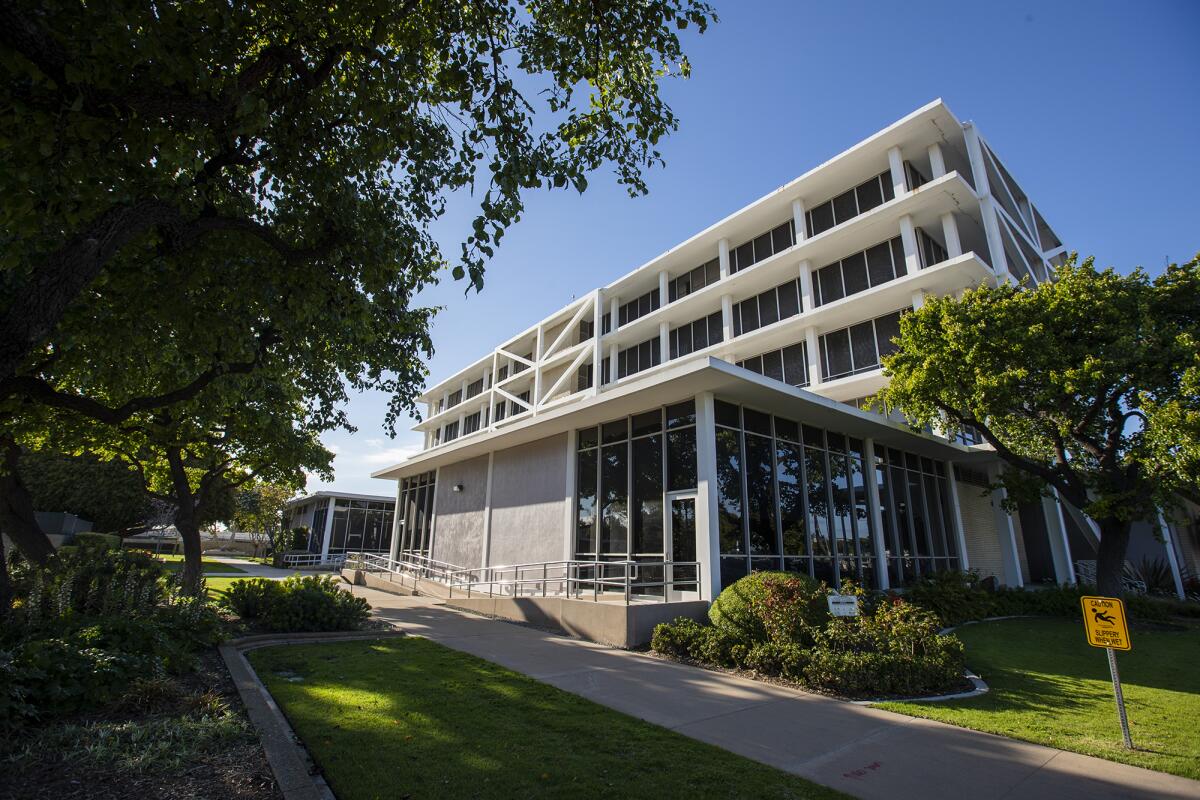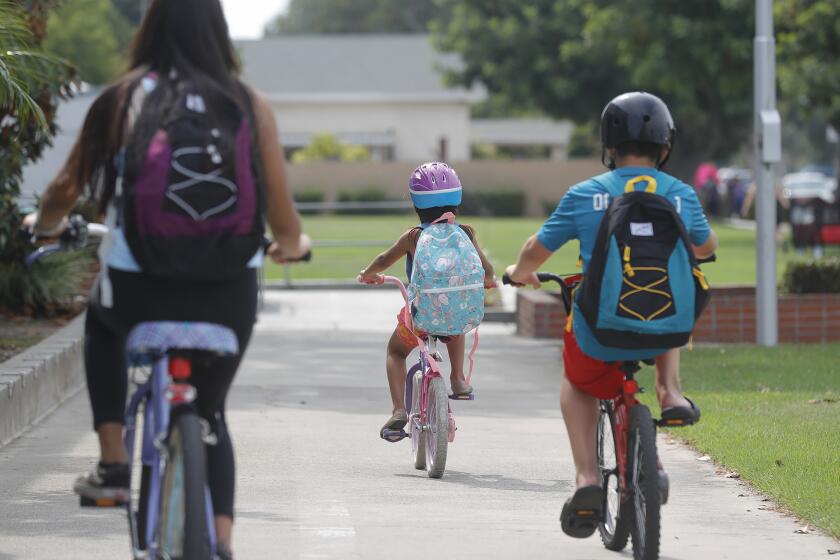With 4 seats up on Costa Mesa City Council come Nov. 3, members spar over pay cuts, cannabis resolution

- Share via
With three council seats and the city’s mayorship up for grabs on Nov. 3, Costa Mesa City Council members traded barbs Tuesday night on two issues that could influence voters’ opinion on candidates — reducing council pay and supporting a retail cannabis measure.
Two efforts, one examining a reduction in council members’ salaries and the other a resolution officially supporting a November ballot measure to allow the sales and delivery of retail cannabis, were hotly discussed by panelists in a regular meeting.
The council considered potentially reducing members’ monthly compensation as a sign of support for city employees, most of whom have taken 5% pay cuts in the wake of a massive coronavirus-related budget shortfall.
Council members currently earn $904 each month and receive additional benefits that may be applied to healthcare costs or retirement savings. As an example, Mayor Pro Tem John Stephens estimated his monthly benefit amount at around $2,100.
The soonest Orange County can reopen most of its schools for in-person learning is Sept. 22. The county is listed on the worst level in California’s new four-color, tiered monitoring system for COVID-19.
Officials may voluntarily waive or reduce their compensation, but Councilman Allan Mansoor in July floated permanent, across-the-board cuts of 5% or 10% as a sign of good faith.
“It would go a long way to showing leadership in our community and at least setting the tone and the example of trying to solve our [financial] situation,” Mansoor said.
According to city policy, council-approved reductions may only be applied at the start of a new council term and not mid-stream, meaning council members, like Mansoor, who have termed out or will not be seeking reelection in November would not have to forego compensation.
Additionally, the three council members — Manuel Chavez, Andrea Marr and Arlis Reynolds — whose seats are not up for reelection in November would also not be impacted by such a reduction.
Stephens and Mayor Katrina Foley, both seeking re-election in November, said they’d already signed waivers volunteering a 20% pay cut.
“Council Member Mansoor, did you take a cut in pay already?” Foley asked.
“I refused all pay raises in Sacramento, when it was a real salary, a real livelihood,” said Mansoor, a state assemblyman from 2010 to 2014. “This is nothing — I can go and fill out a form for a couple more months and it’s going to save the city $90.
“It’s so pathetic and so symbolic that you want to [say] up there, ‘I volunteered to take a cut in pay’ and next month, or any time, you can rescind it like that,” he continued. “I’m talking about putting something in place permanently.”
After several months of being mostly closed during the coronavirus pandemic, some 100 interior shops in the Costa Mesa shopping mall were reopened Monday and ready for business.
Ultimately, council members voted 6-1 against the salary reductions, instead agreeing to post the names of all members who volunteered pay cuts through the waiver process on the city’s website.
Council opinion split again when members discussed passing a formal resolution affirming support for a city-sponsored ballot measure in November that will ask voters to decide whether to allow the retail sales and delivery of recreational cannabis in Costa Mesa.
The city currently maintains regulations allowing for distribution, manufacturing, processing and laboratory research related to medical and recreational cannabis in certain zoned areas under 2016’s Measure X. But on July 21, the council decided to place before voters a new Measure Q, which would expand allowable cannabis uses with certain conditions.
If passed, the measure could generate $1.4 million to $3.1 million annually, in part, through a proposed taxation of up to 5%, according to city documents.
City Atty. Kimberly Barlow confirmed it is within the city’s right to advocate for a city-sponsored ballot measure and to educate the public about aspects of the proposal. Councilwoman Sandy Genis, running against Foley for the mayor’s seat in November, said she opposed telling people how they should vote.
“When we take a position on legislation that’s pending in Washington or Sacramento, we’re sending a resolution on behalf of Costa Mesa,” Genis said. “[With this], on behalf of Costa Mesa, we’re telling the people of Costa Mesa how to vote. To me, that is anti-Democratic.”
Mansoor moved to take no action, rebuking city officials for not publicly posting a community poll on cannabis issues conducted in early July to the city’s website until just before Tuesday’s meeting. Stephens, however, made a substitute motion to approve the resolution.
Council members agreed 5-2, with Mansoor and Genis opposed.
“It’s implicit that, because we voted to put the item on the ballot, that we support the item,” Stephens said. “This resolution simply makes explicit what is implicit.”
Conducted by firm FM3 Research, the city’s poll indicates 68% support for Measure Q among 427 respondents likely to vote in November.
Breaking respondents into sub-categories, such as gender and political affiliation, the poll found independent voters showed the strongest support — 72% favorable to 24% opposed — compared to Democrats, who were 69% in favor and 25% opposed.
Republican respondents were split, with 49% saying they favored Measure Q and 47% opposed.
All the latest on Orange County from Orange County.
Get our free TimesOC newsletter.
You may occasionally receive promotional content from the Daily Pilot.






